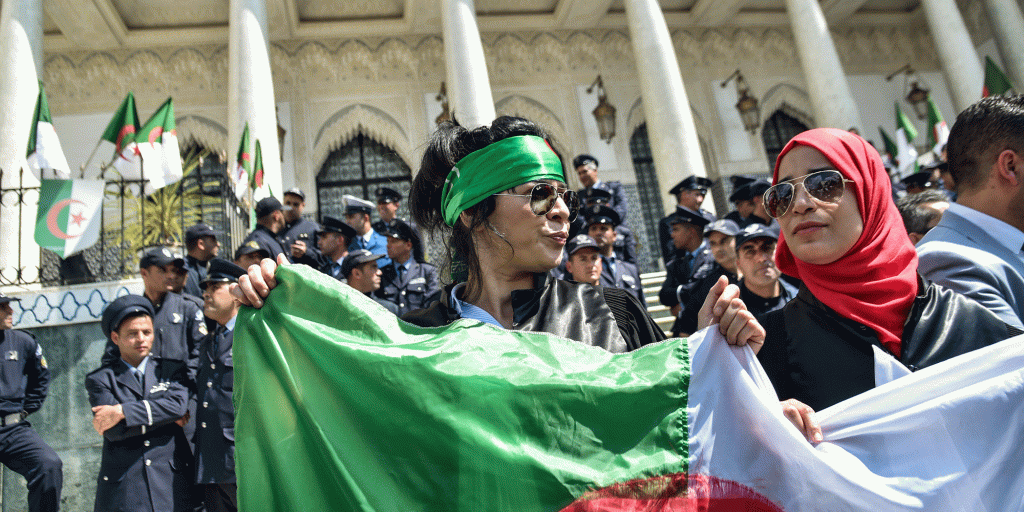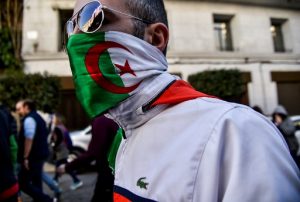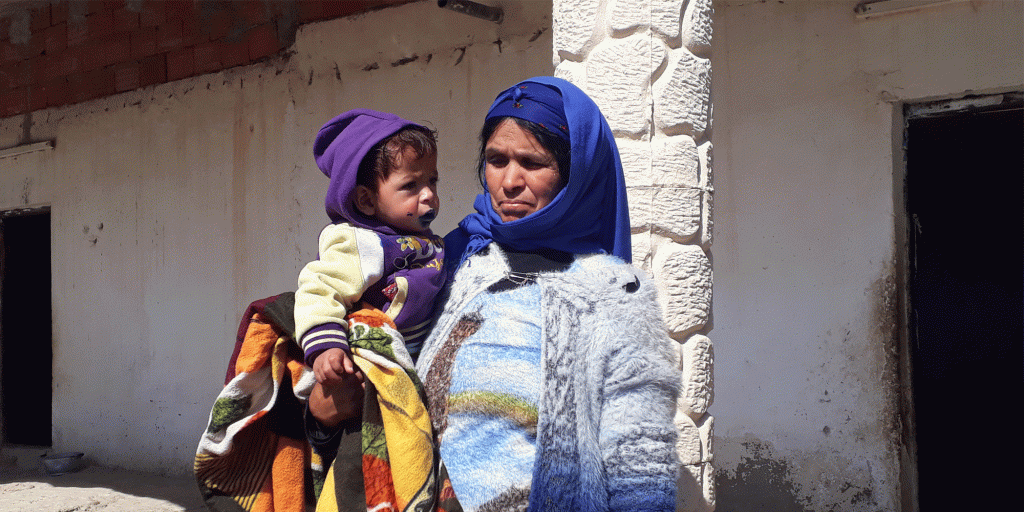The “Coronavirus” outbreak confounded Algerian and Tunisian politicians―just as in other countries― and forced them to take tough measures to reduce its spread, especially as their health system is not qualified to face extreme scenarios. However, on the other hand, it can be noted that this crisis gave the rulers of both countries a break from popular protests and movements opposing their policies. The “Coronavirus” helped the Algerian authority―the biggest beneficiary― avoid the pressure of the people’s movements that went on for more than a year, and gave it a chance to control the situation by controlling the popular movement and restricting the freedom of expression in order to prepare for the post-quarantine period.
In Tunisia, the situation seems more complicated, as the government that has just started its term, is now facing difficult economic conditions and a social situation on the verge of exploding. Tunisia may have avoided the inevitable confrontation with the Tunisians’ protests who were sick and tired of applying stopgap solutions that only led to a further worsening of their living conditions. However, it will not escape this confrontation, whether the quarantine period is prolonged or ends, due to the deteriorating condition of the poor and middle class. This is exacerbated by the exceptional decisions expected from the Government to save the economy, which will target the pockets of the low-income classes as usual, and are likely to ignite a social movement of protest again.

Common Givens
Both countries have many things in common, the first is the limited number of cases compared to what had been recorded in Europe, which is not that far away from them. So far, Algeria has not exceeded 3,000 cases. Second, both countries had a quick response and took strict measures to deal with the pandemic, given the fragility of their healthcare systems, that could not have withstood the aggravation of the situation and the increase of cases. While the international standards require 2.7 beds per one thousand citizens, there are only 1.9 hospital beds per one thousand in Algeria. As for Tunisia―the closest state in the Maghreb region to the international standard―the number does not exceed 2.3 hospital beds per one thousand, in its various hospitals.
Compared to Tunisia and Morocco, Algeria is the country that is benefiting the most from the “CoronaVirus”. Because of the outbreak of this epidemic and the high number of infected cases, the movement’s leaders have called for the cessation of the protests that continued for 13 months.
Thirdly, and perhaps most critically, both countries are likely to face―because of the ‘Coronavirus’―serious repercussions affecting their economies. As for Algeria, whose economy is totally energy‐dependent, it will come out of this crisis with dire consequences, especially when the Crude oil price fell dramatically to an unprecedented level. While Tunisia―whose economy is already experiencing major difficulties―will come out of this exhausted after the collapse of its vital tourism sector, which contributes about 16% of its gross domestic product (GDP).
Despite this common given, the Post ‘Coronavirus’ Phase will not be the same in both countries. The Algerian authorities may be able to control its public by force, in the future, after it got prepared for this in the comprehensive quarantine period. Tunisia’s government on the other hand will not survive waves of popular anger and will not be able to use repression as in Algeria, while promoting itself as a democratic country that respects people’s right to demonstrate, so confrontation will be very difficult and complicated.


Algeria: The groundwork for a future without popular movement
Compared to Tunisia and Morocco, Algeria is the country that is benefiting the most from the “CoronaVirus”. Because of the outbreak of this epidemic and the high number of infected cases, the movement’s leaders have called for the cessation of the protests that continued for 13 months. Indeed, the masses responded to this call since March 13th, giving the Algerian authorities a chance to take a break from the pressure of protests that started in February 2019.
It seems that the Algerian authorities are deeply aware of the value of this break, so they are gradually seeking to take some measures that would ensure freezing this mobility, nullifying its effectiveness and limiting its impact. By imposing its control on the media and civil society, taking advantage of the impossibility of people turning to protests during this difficult period, as an expression of their rejection of what is happening.


The Algerian authorities may think that their policies of crackdown and repression will enable them to re-establish their control and suppress the voices of the revolutionaries calling for reform, thus, it is clear that the authorities misunderstood what happened. As the youth of this movement, who have remained steadfast for 57 weeks, despite the major political concessions, such as the resignation of former President Abdelaziz Bouteflika in April 2019, under the pressure of the army, and the successive maneuvers by political parties, will not reward their politicians with silence after the decline of the “CoronaVirus ” phase.
What makes the situation more complicated are the economic repercussions that will inevitably affect the Algerians and be an important factor in provoking their anger and pushing them to return to the protests in full force. The Algerian authorities can only avoid this scenario by undertaking major reforms that meet the demands of the movement, which is a difficult task to accomplish.
“After extensive discussions, the movement decided to suspend the marches to protect the health of citizens,” says Algerian political analyst Louisa Ait Hamdash. “Among the points discussed was that this suspension would give the ruling authority a breathing space. This is indeed what happened, because the marches were considered a means of pressure, especially in light of the closure of other platforms of expression, the media continued to be censured, and gatherings were not allowed.”
Hamdash also confirms the continued frequency of the arrests, harassment, and summons targeting political activists, bloggers, and opponents, and although these measures have long preceded the quarantine period, the authorities have seized the opportunity to escalate their violations of freedom of expression.
The political analyst acknowledges that the current health crisis has worsened economic challenges in Algeria and reinforced suspicions about the government’s ability to deal effectively with the crisis in the absence of a convincing plan of action so far.
“So, it is expected that all these conditions will cause the protests to break out again. However, this time it will not be easy to contain or stop them unless the authority decides to start a comprehensive consensual reform project that integrates the elements of the political opposition, in order to achieve the national cohesion necessary to face the upcoming economic challenges. It is illogical to seek a solution to the economic crisis while the political crisis continues.”
Increasing Arrests
Since late March 2020, arrests, convictions, and official summonses of opposition leaders, activists, and journalists have increased, as a means of gradually undermining the freedom of the media and silencing the voices that criticize the government.
On March 24, the Court of Appeal in Algiers sentenced the political opposition leader Kareem Tabo to one year in prison and a fine of 50,000 Algerian dinars (about $ 405), over charges described by Amnesty International as “fabricated”, related to “instigating violence, and threatening national security”, on account of his speech in video clips published by his political party on facebook, where he criticized the intervention of the military in politics.
The authorities have seized the opportunity to escalate their violations against freedom of expression.
In late March, the correspondent of Reporters Without Borders, Khaled Dararni, was arrested in Algiers. Dararni is also the founder of the “Casbah Tribune” website, and the correspondent of the French TV5Monde channel. He was covering the protests that were going on in Algeria for more than a year. He was arrested on March 7, while covering a protest against the regime in the capital. He was accused of “inciting crowds and compromising the unity of the nation”, but was released on the 10th of the same month, only to be arrested again on the 28th.
On April 6, the Sidi Mohamed Court of first instance in Algiers sentenced the President of the civic group “Youth Action Rally” (RAJ) Abdel-Wahab Fersaoui to one year in prison and a fine of 20,000 Algerian dinars. The authorities only convicted Abdel-Wahab Fersaoui based on account of the criticism he had written on Facebook against the crackdown of the movement in Algeria, in addition to his participation in protests calling for democracy in the country, according to Amnesty International. Furthermore, the judicial police summoned dozens of activists involved in the protests and interrogated them about their political activities.
Amnesty International considered that the court rulings against them were intended to send a message of warning to the demonstrators, including political activists, and other civil society activists, telling them that anyone who would dare oppose the government or criticize it will be punished.
By doing this, the Algerian authorities paved the way for a post-quarantine period without protests, after passing strong messages to the activists of the opposition movement, telling them that those who oppose the government and the military’s choices will not be immune to their crack down. This step was taken because they know that the consequences of the coronavirus crisis will be devastating, especially to the economy, and that it will be difficult to fulfill the demands of the protestors that may increase in the future, especially under the current circumstances due to the lack of fulfillment of the expected goals, in addition to the additional burdens the Algerian citizen will endure due to the effect of coronavirus crisis on their country’s economy, which is already depleted. Add to this the implications of the unprecedented decline in energy prices, which are the main driver of the Algerian economy. Therefore, the iron fist will probably be the awaited option.


Tunisia Faces Difficult Options
The coming days will not be easy for the Tunisian government, which will find itself trapped between the hammer of dealing with the collapsing economy by following stringent measures that will double the burdens on its already exhausted citizens, and the anvil of the exhaustion of social patience, and the opposition movements that may arise due to that.
The total lockdown procedures and quarantine imposed on the country exacerbated the economic crisis in Tunisia, which is facing the worst recession since its independence in 1956, especially with the total paralysis of the tourism sector, which is the main source of foreign currency in Tunisia. For the first time, last year, Tunisia received 9 million tourists and achieved a revenue of about $2 billion USD from tourism.
In an official message from the Tunisian authorities to the IMF, it was made clear that the vital tourism sector is at risk of losses that may amount to 4 billion dinars, ($1.4 billion USD) in addition to 400,000 people losing their jobs due to the repercussions of coronavirus.
The International Monetary Fund, which loaned Tunisia $745 million USD to deal with the consequences of the Coronavirus crisis, expects the Tunisian economy to shrink by 4.3 percent during 2020, under the influence of the Coronavirus crisis, in the worst recession since 1956, hinting the possibility of starting a new funding program with Tunisia during the second half of the current year.
In the midst of this disastrous economic situation, the government of Elias Al-Fakhfakh is entering a new stage with unknown consequences, which started mainly by cancelling food & transportation coupons for public servants, reducing one work day of the government and private sectors, suspending promotions and assignments in public posts. Add to that the popular expectations that taxes would be raised according to monthly and yearly income.
These initial measures will be followed by other measures soon, which will affect, as usual, the simple citizen’s pocket, companies and the middle class, to be able to pay the state’s debts that have reached unprecedented levels, in the absence of projects that would make the citizens feel any benefit for what they are paying. Al-Fakhfakh and his ministers will continue to follow in the footsteps of those who preceded them by resorting to the stopgap solutions based on the depletion of the citizen’s pocket, instead of declaring a real war on corruption, smugglers and monopolists.
But it seems that the Tunisian government, while trying to promote a nationalistic rhetoric based on provoking the citizens’ emotional sentiment, and urging them to support their country to overcome the repercussions of this crisis, is unaware that the patience of the Tunisians is about to run out, that an explosion is imminent, and that continuing to deal with the citizens with the logic of the tax-collection state will result in a large scale popular agitation, which may resemble the movements that went on in the country during the time of the revolution.
In that case, the government will not be able to use force to prevent people from demonstrating because the world is focusing on Tunisia, as a country on the way towards democracy. Therefore, choices will be limited; either resort to oppression and lose this image in front of the world, or change the approach of addressing the crisis, by seriously focusing on corruption and punishing the corrupt, instead of burdening the citizens with consequences of the crises.
Commenting on the situation, Tunisian political analyst Farid Al-Olibi believes that the Coronavirus epidemic has temporarily limited protests in several Maghreb countries. These protests demanded social rights and political rights related to changing the political systems and punishing the corrupt, among other demands. On the other hand, it exacerbated the suffering of the people with the increasing prices and loss of some food materials, and opened some sensitive issues, like the vulnerability of the health sector, the implication of some government officials in monopolizing some goods and unfair distribution of aid, which threatens with larger-scale future protests.
Al-Olibi confirmed that “in a country like Tunisia, the contradiction between trade unions and those representing money and business owners has emerged more and more, and governments will find it difficult to control the situation during the next few months, especially since the people are getting used to demonstrating in the streets and squares, and are no longer afraid of confrontation, after watching the uprisings around the other Arab countries during the past few years. If the quarantine continues for a long time, with the promised aid not delivered, and the social situation worsening, or in case it ends soon and new taxes and measures are imposed, the protests will come through to the surface even more, and there are indicators that they are being exploited by different political powers, including terrorist groups, which will put the government in a difficult situation.”






